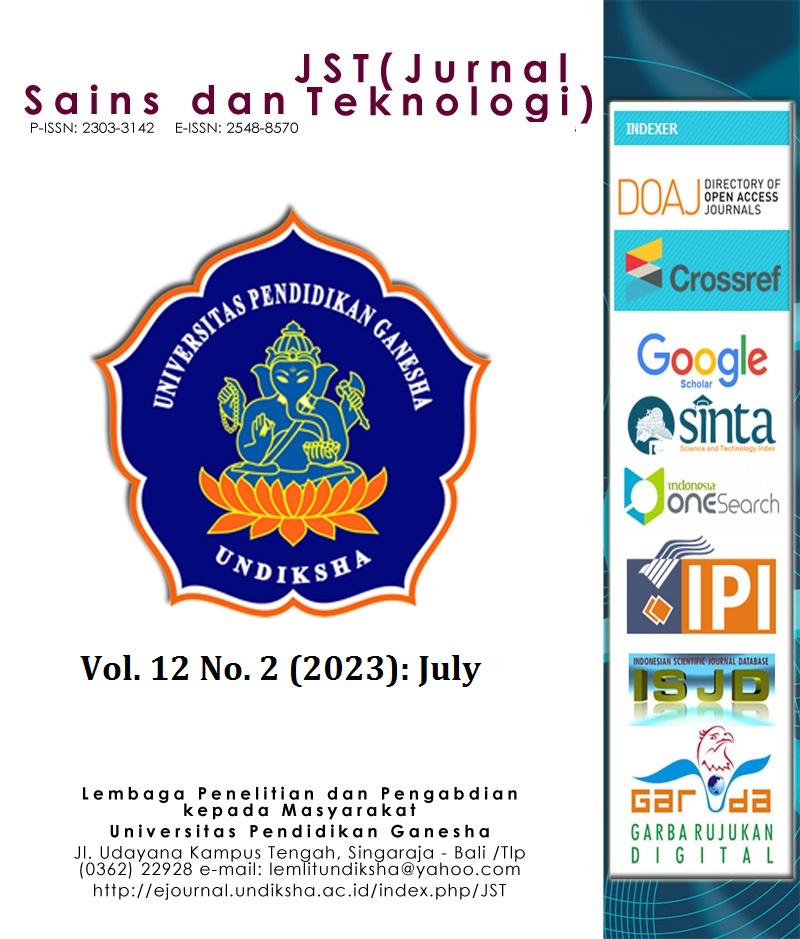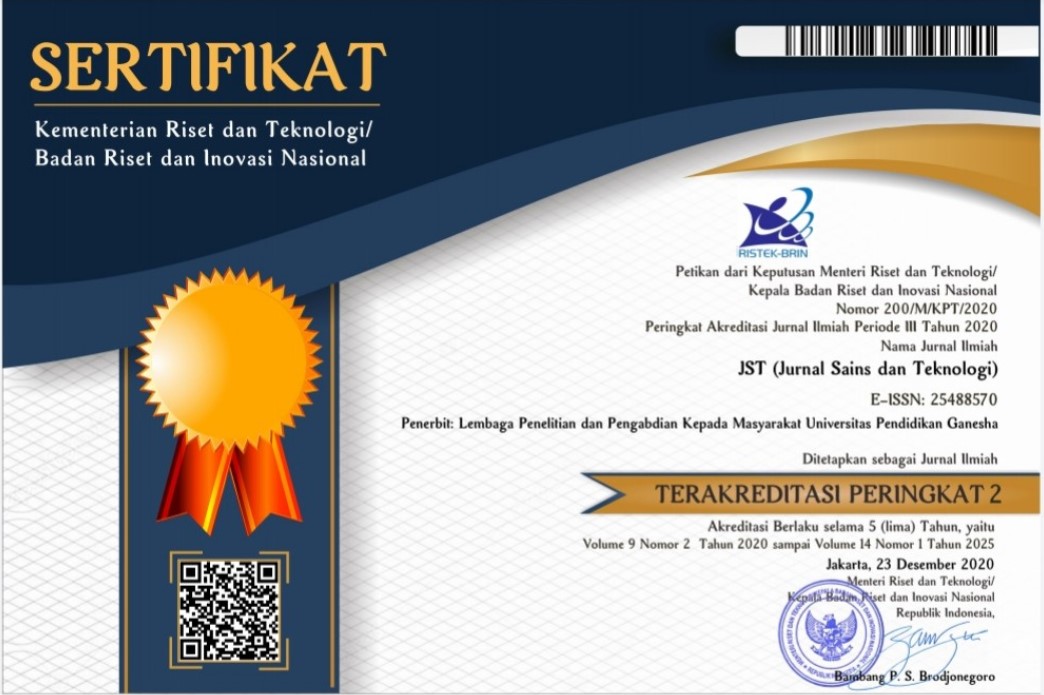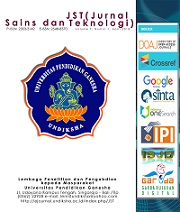Sifat Mekanis Komposit Limbah Masker Berpenguat Serat Bambu
DOI:
https://doi.org/10.23887/jstundiksha.v12i2.50606Keywords:
Sifat Mekanis, Komposit, Limbah Masker, Serat BambuAbstract
Daur ulang limbah masker menjadi material komposit berpenguat serat bambu merupakan cara alternatif untuk mengurangi penumpukan limbah masker yang membahayakan lingkungan selama pandemi covid-19. Tujuan penelitian ini untuk menganalisis pengaruh variasi fraksi massa campuran serat bambu terhadap sifat mekanis pada komposit limbah masker. Pada penelitian dengan menggunakan metode eksperimen ini, dikembangkan komposit berbasis limbah masker medis berpenguat serat bambu dengan variasi fraksi massa serat sebesar 0%, 4%, 8%, 12%, dan 16%. Sifat mekanik diukur dari nilai rata-rata kekuatan tarik dan kekuatan impak dari lima spesimen pada tiap variasi. Analisis hasil penelitian dilakukan secara deskriptif berdasarkan nilai kekuatan material dan visualisasi patahan spesimen dari Scanning Electron Microscopy (SEM). Hasil penelitian menunjukkan adanya pengaruh fraksi masa serat bambu terhadap kekuatan material komposit berbasis limbah masker. Kekuatan tarik tertinggi terdapat pada variasi 0% sebesar 18,6 MPa dan terendah pada variasi 8% sebesar 10,3 MPa. Sedangkan, kekuatan impak tertinggi terdapat pada variasi 0% sebesar 7,84 kJ/ dan terendah pada variasi 8% sebesar 1,76 kJ/ . Meningkatnya jumlah serat bambu pada matriks limbah masker menyebabkan penurunan sifat mekanik material.
References
Akber Abbasi, S., Khalil, A. B., & Arslan, M. (2020). Extensive Use Of Face Masks During Covid-19 Pandemic: Microplastic Pollution And Potential Health Concerns In The Arabian Peninsula. Saudi Journal of Biological Sciences, 27(12), 3181–3186. https://doi.org/10.1016/j.sjbs.2020.09.05.
Amran, M., Sivakumar, L. D., Salleh, S., & Rajaizam, A. (2016). Effect Of Fiber Loading On The Mechanical Properties Of Bagasse Fiber-Reinforced Polypropylene Composites. Advances in Mechanical Engineering, 8(8), 1–5. https://doi.org/10.1177/1687814016664258.
Battegazzore, D., Cravero, F., & Frache, A. (2020). Is It Possible To Mechanical Recycle The Materials Of The Disposable Filtering Masks? Polymers, 12(11), 1–18. https://doi.org/10.3390/polym12112726.
Battegazzore, D., Cravero, F., & Frache, A. (2022). Development Of Disposable Filtering Mask Recycled Materials: Impact Of Blending With Recycled Mixed Polyolefin And Their Aging Stability. Resources, Conservation and Recycling, 177, 105974. https://doi.org/10.1016/j.resconrec.2021.105974.
Chattopadhyay, S. K., Khandal, R. K., Uppaluri, R., & Ghoshal, A. K. (2011). Bamboo Fiber Reinforced Polypropylene Composites And Their Mechanical, Thermal, And Morphological Properties. Journal of Applied Polymer Science, 119(5), 1619–1626. https://doi.org/10.1002/app.32826.
Crespo, C., Ibarz, G., Sáenz, C., Gonzalez, P., & Roche, S. (2021). Study Of Recycling Potential Of FFP2 Face Masks And Characterization Of The Plastic Mix-Material Obtained. A Way Of Reducing Waste In Times Of Covid-19. In Waste and Biomass Valorization. https://doi.org/10.1007/s12649-021-01476-0.
E. Indra. (2013). Studi Kekuatan Dielektrik Pada Bahan Campuran Abu Sekam Padi Dengan Resin Epoksi. Jurnal Teknik Elektro Universitas Tanjungpura (Jurnal Untan), 1(1), 4.
Fadare, O. O., & Okoffo, E. D. (2020). Covid-19 Face Masks: A Potential Source Of Microplastic Fibers In The Environment. Science of the Total Environment, 737, 140279. https://doi.org/10.1016/j.scitotenv.2020.140279.
Getu, D., Babu, R., Masresha, M., & Kishan, S. (2020). Materials Today : Proceedings Production and characterization of bamboo and sisal fiber reinforced hybrid composite for interior automotive body application. Materials Today: Proceedings. https://doi.org/10.1016/j.matpr.2020.08.780.
Glukhikh, V. V, Buryndin, V. G., Artyemov, A. V, Savinovskih, A. V, Krivonogov, P. S., & Krivonogova, A. S. (2020). Plastics: Physical-Mnd-mechanical Properties And Biodegradable Potential. Foods and Raw Materials, 8(1), 149–154. https://doi.org/10.21603/2308-4057-2020-1-149-154.
Guo, W., Kalali, E. N., Wang, X., Xing, W., Zhang, P., Song, L., & Hu, Y. (2019). Processing Bulk Natural Bamboo Into A Strong And Flame-Retardant Composite Material. Industrial Crops and Products, 138, 111478. https://doi.org/10.1016/j.indcrop.2019.111478.
Hao, J., Yi, X., Zong, G., Song, Y., Wang, W., Cheng, H., & Wang, G. (2021). Fabrication Of Long Bamboo Fiber-Reinforced Thermoplastic Composite by Extrusion And Improvement Of Its Properties. Industrial Crops and Products, 173, 11412. https://doi.org/10.1016/j.indcrop.2021.114120.
Hartanto, B. W., & Mayasari, D. S. (2021). Environmentally Friendly Non-Medical Mask: An Attempt To Reduce The Environmental Impact From Used Masks During Covid-19 Pandemic. Science of the Total Environment, 760, 144143. https://doi.org/10.1016/j.scitotenv.2020.144143.
Karina, M., Syampurwadi, A., Satoto, R., Irmawati, Y., & Puspitasari, T. (2017). Physical And Mechanical Properties Of Recycled Polypropylene Composites Reinforced With Rice Straw Lignin. BioResources, 12(3), 5801–5811. https://doi.org/10.15376/biores.12.3.5801-5811.
Kirk, C. P., & Rifkin, L. S. (2020). I’ll trade you diamonds for toilet paper: Consumer reacting, coping and adapting behaviors in the COVID-19 pandemic. Journal of Business Research, 117(May), 124–131. https://doi.org/10.1016/j.jbusres.2020.05.028.
Lokantara, I. P., Suardana, N. P. G., Surata, I. W., & Winaya, I. N. S. (2019). The Effect Of Fiber Volume Fraction On Tensile And Impact Properties Of Eleusine Indica Grass Reinforced Polypropylene Bio Composite. IOP Conference Series: Materials Science and Engineering, 539(1). https://doi.org/10.1088/1757-899X/539/1/012028.
Maderuelo-Sanz, R., Acedo-Fuentes, P., García-Cobos, F. J., Sánchez-Delgado, F. J., Mota-López, M. I., & Meneses-Rodríguez, J. M. (2021). The Recycling Of Surgical Face Masks As Sound Porous Absorbers: Preliminary Evaluation. Science of the Total Environment, 786, 147461. https://doi.org/10.1016/j.scitotenv.2021.147461.
Nugraheni, D. M. K., Noranita, B., Adhy, S., & Nugroho, A. . (2022). Adopting COBIT 2019 for Information Technology Risks in University Online Learning During COVID-19. In: Alaali, M. (eds) COVID-19 Challenges to University Information Technology Governance. 192–209. https://doi.org/10.1007/978-3-031-13351-0_9.
Rowan, N. J., & Laffey, J. G. (2021). Unlocking The Surge In Demand For Personal And Protective Equipment (PPE) And Improvised Face Coverings Arising From Coronavirus Disease (Covid-19) pandemic – Implications For Efficacy, Re-Use And Sustainable Waste Management. Science of the Total Environment, 752, 142259. https://doi.org/10.1016/j.scitotenv.2020.142259.
Rubio-Romero, J. C., Pardo-Ferreira, M. del C., Torrecilla-García, J. A., & Calero-Castro, S. (2020). Disposable Masks: Disinfection And Sterilization For Reuse, And Non-Certified Manufacturing, In The Face Of Shortages During The Covid-19 Pandemic. Safety Science, 129, 104830. https://doi.org/10.1016/j.ssci.2020.104830.
Saberian, M., Li, J., Kilmartin-Lynch, S., & Boroujeni, M. (2021). Repurposing Of Covid-19 Single-Use Face Masks For Pavements Base/Subbase. Science of the Total Environment, 769, 145527. https://doi.org/10.1016/j.scitotenv.2021.145527.
Saidah, A., Susilowati, S. E., & Nofendri, Y. (2018). Pengaruh Fraksi Volume Serat Terhadap Kekuatan Mekanik Komposit Serat Jerami Padi Epoxy Dan Serat Jerami Padi Resin Yukalac 157. Jurnal Konversi Energi Dan Manufaktur, 5(2), 96–101. https://doi.org/10.21009/jkem.5.2.7.
Selvaranjan, K., Navaratnam, S., Rajeev, P., & Ravintherakumaran, N. (2021). Environmental challenges induced by extensive use of face masks during COVID-19: A review and potential solutions. Environmental Challenges, 3. https://doi.org/10.1016/j.envc.2021.100039.
Ubaidillah, A., Sujito, S., & Purwandari, E. (2019). Pengaruh Fraksi Massa Terhadap Sifat Mekanik Material Komposit Binderless Dari Ampas Tebu Dan Serbuk Kayu Sengon. Jurnal Sains Dasar, 8(2), 70–74. https://doi.org/10.21831/jsd.v8i2.23676.
Widiastuti, I., Saputra, H. C., Sidik, S., Kusuma, W., & Harjanto, B. (2022). Mechanical And Thermal Properties Of Recycled High-Density Polyethylene/Bamboo With Different Fiber Loadings. 151–156. https://doi.org/10.1515/eng-2022-0010.
Xiang, M., Yang, Z., Zhou, S., Lu, T., Zhang, S., Sun, L., & Dong, S. (2021). Polymer Composites Completely Derived from Waste: The Crystalline Structure And The Mechanical Enhancement Effect. ACS Applied Polymer Materials, 3(7), 3679–3684. https://doi.org/10.1021/ACSAPM.1C00696.
Yu, R., Wen, X., Liu, J., Wang, Y., Chen, X., Wenelska, K., Mijowska, E., & Tang, T. (2021). A Green And High-Yield Route To Recycle Waste Masks Into CNTs/Ni Hybrids Via Catalytic Carbonization And Their Application For Superior Microwave Absorption. Applied Catalysis B: Environmental, 298, 120544. https://doi.org/10.1016/j.apcatb.2021.120544.
Downloads
Published
How to Cite
Issue
Section
License
Copyright (c) 2022 Ade Pangestu, Yuyun Estriyanto, Indah Widiastuti

This work is licensed under a Creative Commons Attribution-ShareAlike 4.0 International License.
Authors who publish with the Jurnal Sains dan Teknologi (JST) agree to the following terms:
- Authors retain copyright and grant the journal the right of first publication with the work simultaneously licensed under a Creative Commons Attribution License (CC BY-SA 4.0) that allows others to share the work with an acknowledgment of the work's authorship and initial publication in this journal.
- Authors are able to enter into separate, additional contractual arrangements for the non-exclusive distribution of the journal's published version of the work (e.g., post it to an institutional repository or publish it in a book), with an acknowledgment of its initial publication in this journal.
- Authors are permitted and encouraged to post their work online (e.g., in institutional repositories or on their website) prior to and during the submission process, as it can lead to productive exchanges, as well as earlier and greater citation of published work. (See The Effect of Open Access)
















